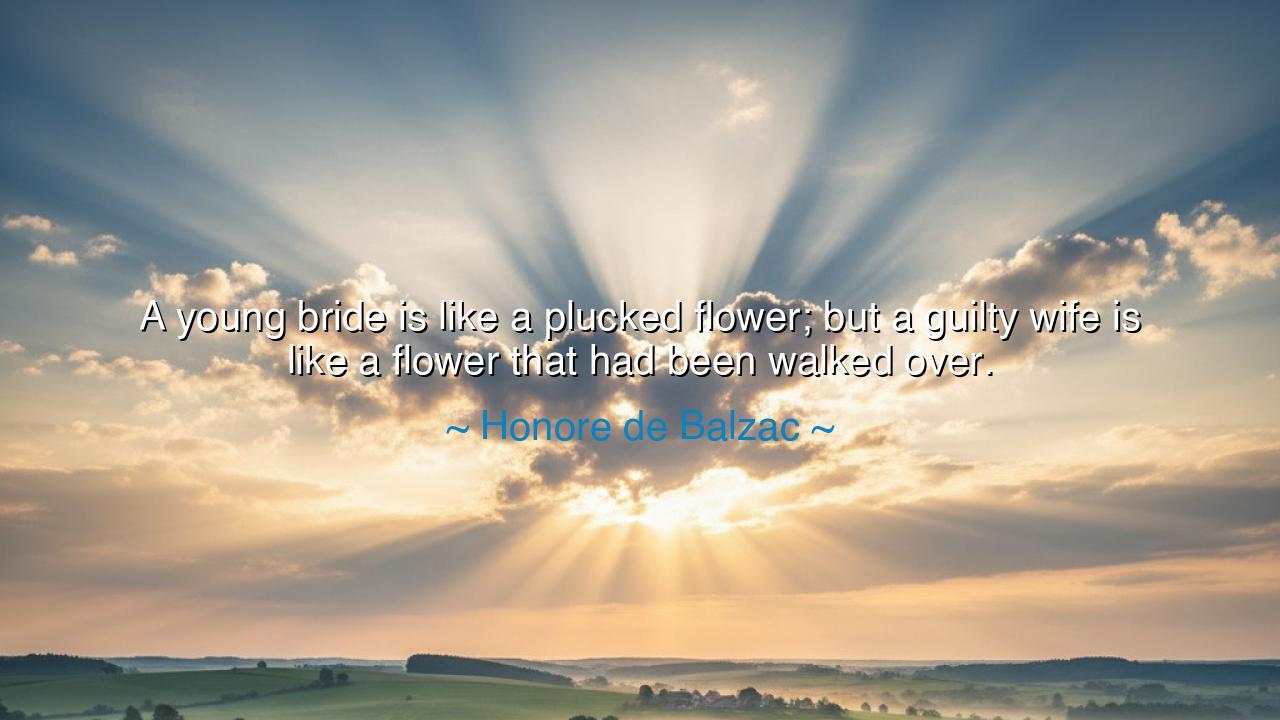
A young bride is like a plucked flower; but a guilty wife is
A young bride is like a plucked flower; but a guilty wife is like a flower that had been walked over.






The words of Honoré de Balzac fall with the force of a moral parable: “A young bride is like a plucked flower; but a guilty wife is like a flower that had been walked over.” In this image he draws from nature, likening purity and innocence to the beauty of a freshly gathered bloom, radiant though already removed from its stem. Yet when guilt enters, when betrayal mars the bond of marriage, the image becomes not of simple fragility but of destruction—a flower not admired, but trampled underfoot, its grace shattered and its fragrance lost.
The young bride, in Balzac’s vision, carries the freshness of hope, the untested promise of devotion. Though her freedom is surrendered, like a flower plucked from the field, she retains her brightness, her sweetness, her worth. The guilty wife, by contrast, embodies not the sacrifice of freedom but the breaking of trust. Hers is not the delicate fragility of innocence but the bruised ruin of betrayal, for once trust is crushed, it is not easily restored.
History reveals the sting of Balzac’s metaphor. In ancient Rome, matrons who strayed from their vows were judged harshly, often shamed before all, while the innocent bride was exalted as a symbol of family honor. The tale of Helen of Troy echoes this theme: once a queen, her flight with Paris brought upon her the wrath of nations. To the poets, she was no longer the radiant bride but the cause of ruin, her name whispered as both beauty and curse. Her fall revealed how quickly society turns admiration into scorn when guilt stains the flower of marriage.
Yet there is a deeper wisdom here. Balzac does not merely condemn; he warns of the fragile nature of trust. For the plucked flower, though severed from its root, can still adorn and inspire. But once trampled, its beauty cannot be restored. In the same way, a bond may endure sacrifice and change, but rarely survives betrayal untouched. Thus, his words are not merely about women, but about the sacredness of fidelity itself.
Therefore, let this teaching endure: guard the vows of love with vigilance, for they are as fragile as blossoms. Honor the beauty of the bride, cherish the sanctity of the union, and shun the path of guilt that turns joy into ruin. For once trust is broken, like a flower crushed underfoot, it may never again shine with the same fragrance. Balzac’s image, though severe, carries timeless counsel—that love, like a bloom, must be protected with reverence, lest it be lost forever.






AAdministratorAdministrator
Welcome, honored guests. Please leave a comment, we will respond soon